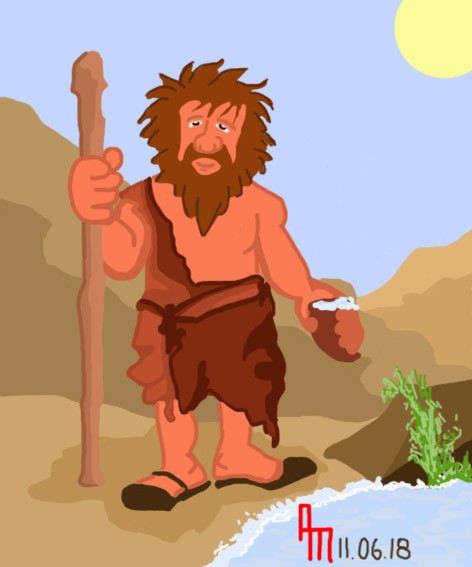Jer 1:4-10; 1 Pt 1:8-12; Lk 1:57-66,80
Fernando Armellini SCJ
Claretian Publications
In the barren womb of Elizabeth the evangelist sees depicted the sterility of Israel and the condition of death in which the whole humanity lies. The desperate situation from which, without the intervention from above, it is not possible for life to sprout.
The central part of the reading develops the theme of the child’s name, “on the eighth day they came to attend the circumcision of the child; they wanted to name him Zechariah, after his father.”
The fact that the relatives and neighbors want to name the baby with the name of his father, Zechariah, is also surprising. The tradition was to give the name of the grandfather, not of the father. It seems that Luke, more than reporting a fact—in itself rather marginal—is interested to note that the name “Zechariah” is not suitable for John.
We begin to grasp why the evangelist combines the naming and the circumcision. Circumcision is the sign of belonging to the people of the covenant. With this rite, one belongs to Israel and becomes an heir of the promises that God made to Abraham and his descendants. On the eighth day, therefore, the Baptist becomes an Israelite, like his father.
“Zechariah” means “God has remembered” or “God remembers” his promises. It is the symbol of Israel, which over the centuries has continued to transmit from father to son “the memory” of the prophecies, without ever seeing the fulfillment.
Now the reason why the Baptist cannot be called “Zachariah” becomes clear. John marks the beginning of the new era. Gone are the days of remembering the promises; for humanity the new day in which the prophecies are fulfilled has dawned. “John” means, “The Lord has given grace, has manifested his goodness, his kindness.”
Zechariah became mute in the temple. Now, when he speaks he utters words of blessing; he sings the wonders that he has witnessed: “The Lord has come and redeemed his people… as he promised through his prophets of old” (Lk 1:68-70).
Zechariah represents Israel that, after so many past centuries of “remembering”, is now witness to the faithfulness of God. He sees “from on high as a rising sun, shining on those who live in darkness and in the shadow of death, and guiding our feet into the way of peace”. Now he recognizes its benefits and proclaims to all peoples the wonders of his love.
Translated by Fr John Ledesma SDB
Abridged by Fr Jijo Kandamkulathy CMF
We are the Voice of the Living God
Susanna Mak
www.FLL.cc
The word “prophet” refers to someone who is “chosen to speak for God” (Dictionary.com). This week’s readings highlight three very different individuals, namely Isaiah, David, and John the Baptist; all lead the way to the Son of God, Christ our Saviour. Though each person is chosen to bear witness during unique times of cultural, social and political uncertainties, their stories reveal the depth and width of God’s love for humanity as well as the splendour of God’s salvific plan. God’s invitation to each is simultaneously intimate, profound, and reassuring. Indeed, through baptism, we are also called to be prophets as these Old Testament figures were called.
Despite what the world tells us, we are loved, valued, and treasured. Our dignity is firmly rooted in God. Genuine validation can only and directly come from our Creator God who forms us in the womb and knows us before we were born. God knows us deeply in ways only God is capable. The Psalmist exalts, “I praise you, for I am […] wonderfully made” (Ps 139:14). Indeed, each of us is “wonderfully made” in the image of God: “The divine image is present in every man. It shines forth in the communion of persons, in the likeness of the unity of the divine persons among themselves” (CCC 1702). Therefore, it is not surprising that God positions us in unique life’s circumstances, endows us with a variety of gifts, invites us to be His voice, and definitely wants to include us in His grand salvific plan.
God calls His people with great intimacy. In the First Reading, Isaiah recognizes how intimately God loves and knows him, “The Lord called me before I was born, while I was in my mother’s womb he named me” (Is 49:1). In the same way, God intentionally “found” David, “son of Jesse”; “a man after [God’s] own heart, who will carry out all [His] wishes” (Acts 13:22). In the Gospel of Luke, God names His prophet, the child to be born to Zechariah and Elizabeth: “you will name him John” (Lk 1:13). Indeed, God knows us more intimately and deeply than we know ourselves.
Most of all, God’s call is always reassuring. God never dismisses His prophets with “Okay, off you go buddy, bon voyage and good luck!” Indeed, Isaiah, David, and John the Baptist are all “polished arrow[s]”, ready to be dispersed at God’s command. So, are we ready for this prophetic mission?



 Follow
Follow



EXCELLENT, WELL WRITTEN, EASY TO COMPREHEND AND AN EXHORTATION TO BECOME WHAT WE ARE CALLED TO BE.